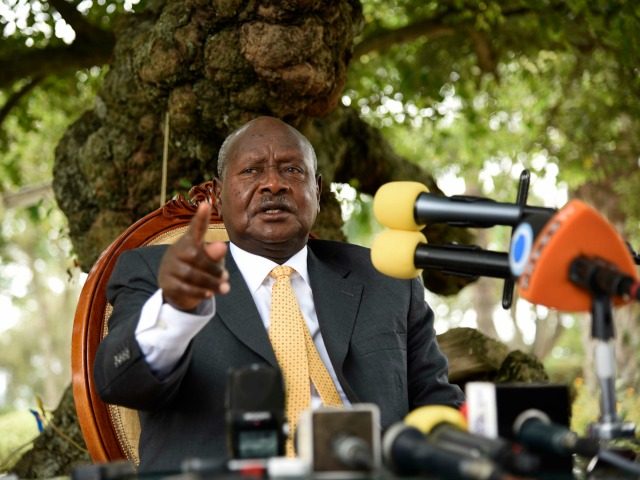Yoweri Museveni, who has been “president” of Uganda for nearly 35 years, accused foreign social media outlets like Twitter and Facebook of attempting to “come and play around with our country” amid a presidential election campaign in remarks Tuesday following his ban on the sites.
Uganda formally announced on Tuesday that it would ban access to all social media sites and online messaging services nationwide in anticipation of Thursday’s presidential election. Facebook later confirmed, that, prior to the ban, it had shut down fraudulent accounts that appeared to be of supporters of Museveni, but were actually run by the Ugandan government and meant to make the dictator appear more popular online than he actually is. After a week in which Twitter silenced tens of thousands of accounts in the United States, including that of the president of the United States, the company issued an outraged message calling for freedom of speech in Uganda.
Museveni is running for re-election against ten official candidates but faces his most difficult challenge in recent member from opposition leader Robert Kyagulanyi, a pop star known more commonly as Bobi Wine. Wine has used social media, particularly Youtube, to promote a campaign of change and resistance to policies such as Museveni’s embrace of Chinese investment and surveillance technology from Huawei.
Prior to the social media ban, Museveni tried and failed to shut down some of Wine’s online presence. Ugandan police have violently cracked down on Wine supporter rallies, including opening fire on a pro-Wine gathering and killing dozens.
On Tuesday, Wine said that the Ugandan military raided his home in the middle of a live radio interview. Ugandan authorities have accused Wine of planning to stage his own kidnapping.
Museveni accused social media companies of foreign intervention in remarks on Tuesday explaining the social media ban.
“Uganda is ours, it is not anybody’s. There is no way anybody can come and play around with our country, to decide who is good, who is bad, this one we will stop. We cannot accept that,” Museveni asserted, accusing social media outlets of violating the nation’s sovereignty by expelling government-linked accounts that had allegedly broken the sites’ terms of use.
Referring specifically to Facebook shutting down government “bot” accounts, Museveni claimed, “that social channel you are talking about, if it’s operating in Uganda, it should be used equitably by everybody who wants to use it. If you want to take sides against the NRM, then that group will not operate in Uganda.”
The NRM, or National Resistance Movement, is Museveni’s Maoist political party.
“We cannot tolerate the arrogance of anybody coming [here] to decide for us who is good and who is bad,” the president concluded.
While Museveni protested this week to social media outlets shutting down Ugandan accounts, his government attempted to silence social media accounts as recently as a month ago. In December, Museveni’s officials demanded that Google, which owns Youtube, shut down 14 accounts for being anti-Museveni or pro-Wine. The Ugandan government accused the accounts of stoking political violence in the country.
“[They contain] extremist or anarchic messages, including messages likely to incite violence against sections of the public on account of their tribes and political opinions … [and] may compromise national security and cause economic sabotage,” a letter from Ugandan officials to Google read.
Anti-Museveni protests have indeed resulted in violence, but largely because police have attacked them. In the most gruesome example of this last year, police opened fire on an otherwise peaceful pro-Wine demonstration, killing 50 people. The director of police responsible for the incident described it as “regrettable.”
Dissatisfaction with Museveni has increased in light of his poor handling of the Chinese coronavirus pandemic. Uganda has documented 38,085 cases of Chinese coronavirus as of Wednesday and only 304 deaths, but experts believe the true toll is much higher given Uganda’s poor infrastructure. To combat the pandemic, Ugandan political leaders have promoted a fraudulent “magic” coronavirus killing spray. Museveni himself implemented a nationwide lockdown, then began posting workout videos on social media.
Yesterday, I discouraged people who have been jogging in groups, exposing themselves to risk amidst the COVID-19 pandemic. You do not have to go outdoors to exercise. Here is my demonstration of how you can exercise indoors and stay safe. pic.twitter.com/Ulbj6vGOYQ
— Yoweri K Museveni (@KagutaMuseveni) April 9, 2020
By April 2020, reports began surfacing that Museveni’s security forces had begun detaining and torturing journalists for reporting on the government’s poor handling of the pandemic. One of those arrested, television anchor Samson Kasumba, appeared in court following charges of “alleged subversive activities” displaying clear signs on his body of torture.
Bobi Wine, Museveni’s top rival for the presidency, was elected as a lawmaker in 2017 after an extensive career as a popular artist. His presidential campaign regularly criticized Museveni for being out-of-touch and holding on too long to power. He has been particularly critical of Museveni’s failure to contain the Chinese coronavirus and of his close relationship to communist China. Under Museveni, Uganda joined the Belt and Road Initiative (BRI) – China’s “debt trap” project to control global infrastructure – in 2018. In February, Museveni took out a nearly $200-million loan from China to build three main highways to expand its oil industry.

COMMENTS
Please let us know if you're having issues with commenting.